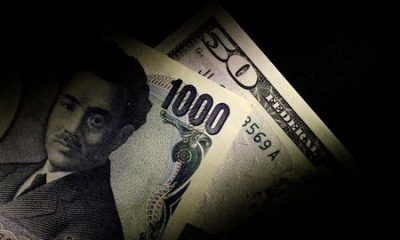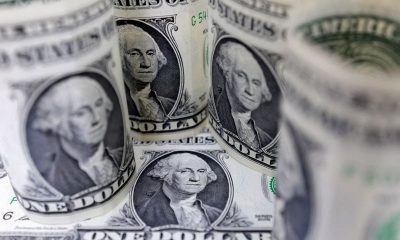Economy
Analysis-IMF warning on China puts ‘Japanization’ risk in spotlight


© Reuters. FILE PHOTO: A businessman walks inside the Japan bridge at La Defense financial and business district in Puteaux, near Paris, France, May 16, 2018. REUTERS/Charles Platiau
2/2
By Leika Kihara
MARRAKECH, Morocco (Reuters) – Hiroshi Wanatabe, Japan’s former top currency diplomat, recalls how Chinese policymakers eagerly studied ways to avert a Japan-style burst of an asset bubble that led to prolonged deflation and economic stagnation – until around 2015.
“Then they stopped. In the past seven to eight years, they seem to be ignoring everything they learned,” said Watanabe, who retains close ties with incumbent policymakers. “Under the Xi administration, China probably shifted its attention away from economics,” he told Reuters.
Now, China may be paying the price. Inflation is stalling and its deepening real estate crisis was identified as among the biggest risks to global growth during the International Monetary Fund and World Bank meeting being held in Marrakech Oct. 9-15.
The world’s second-largest economy is in the spotlight as a country on the brink of “Japanization,” a term describing Japan’s 15-year period of low growth and deflation after the burst of an asset-inflated bubble in the late 1990s.
Some Japanese policymakers are voicing concern partly since a prolonged slump in Japan’s biggest trading partner will deal a huge blow to their export-reliant economy.
“What’s fast emerging is the risk of China slipping into deflation, or the ‘Japanization’ of its economy,” Bank of Japan (BOJ) board member Asahi Noguchi said on Thursday.
“It’s not clear yet whether China is heading toward a situation similar to Japan. But it’s true China’s real estate sector – the backbone of its economy – is slumping, youth job losses are rising and inflation is weakening,” he said in Japan.
In its World Economic Outlook, the IMF cut China’s growth forecast for this year to 5.0% from 5.2% in April, and warned that its property sector crisis could deepen with global spillovers. It projects growth to slow to 4.2% next year.
Data showed on Friday China’s consumer inflation was flat in September, missing forecasts for a 0.2% gain, highlighting the deflationary pressure China faces even as many other countries combat too-high inflation.
Back during its deflationary period from 1998 to 2013, Japan saw core consumer prices fall 0.2% on average, as slumping property prices hit bank balance sheets and cooled investment.
To be sure, there are differences between what is happening in China and the experience of Japan. For one, China’s balance sheet stress and debt overhang are contained to the real estate sector, notably among troubled developers and local provinces.
That contrasts with Japan, where slumping property prices left banks nationwide with a huge pile of bad loans, causing a broad-based credit crunch that prolonged the economic downturn.
For now, the IMF does not see a big risk of China sliding into deflation with inflation seen accelerating, backed by a recovery in demand, Krishna Srinivasan, director of the lender’s Asia and Pacific Department, told a briefing on Friday.
But he urged Beijing to take measures, such as supporting the restructuring of distressed developers and offering guidance to local provinces, to avoid the troubles from broadening.
“Overall, we believe that China can avoid a prolonged period of sub-par growth with the right policies,” Srinivasan said, when asked about the chance of “Japanization” in China.
“The point we’re trying to make is that it’s important to address the property crisis head on, so that it doesn’t become a bigger problem.”
Economy
Russian central bank says it needs months to make sure CPI falling before rate cuts -RBC


© Reuters. Russian Central Bank Governor Elvira Nabiullina attends a news conference in Moscow, Russia June 14, 2019. REUTERS/Shamil Zhumatov/File Photo
MOSCOW (Reuters) – Russia’s central bank will need two to three months to make sure that inflation is steadily declining before taking any decision on interest rate cuts, the bank’s governor Elvira Nabiullina told RBC media on Sunday.
The central bank raised its key interest rate by 100 basis points to 16% earlier in December, hiking for the fifth consecutive meeting in response to stubborn inflation, and suggested that its tightening cycle was nearly over.
Nabiullina said it was not yet clear when exactly the regulator would start cutting rates, however.
“We really need to make sure that inflation is steadily decreasing, that these are not one-off factors that can affect the rate of price growth in a particular month,” she said.
Nabiullina said the bank was taking into account a wide range of indicators but primarily those that “characterize the stability of inflation”.
“This will take two or three months or more – it depends on how much the wide range of indicators that characterize sustainable inflation declines,” she said.
The bank will next convene to set its benchmark rate on Feb. 16.
The governor also said the bank should have started monetary policy tightening earlier than in July, when it embarked on the rate-hiking cycle.
Economy
China identifies second set of projects in $140 billion spending plan


© Reuters. FILE PHOTO: Workers walk past an under-construction area with completed office towers in the background, in Shenzhen’s Qianhai new district, Guangdong province, China August 25, 2023. REUTERS/David Kirton/File Photo
SHANGHAI (Reuters) – China’s top planning body said on Saturday it had identified a second batch of public investment projects, including flood control and disaster relief programmes, under a bond issuance and investment plan announced in October to boost the economy.
With the latest tranche, China has now earmarked more than 800 billion yuan of its 1 trillion yuan ($140 billion) in additional government bond issuance in the fourth quarter, as it focuses on fiscal steps to shore up the flagging economy.
The National Development and Reform Commission (NDRC) said in a statement on Saturday it had identified 9,600 projects with planned investment of more than 560 billion yuan.
China’s economy, the world’s second largest, is struggling to regain its footing post-COVID-19 as policymakers grapple with tepid consumer demand, weak exports, falling foreign investment and a deepening real estate crisis.
The 1 trillion yuan in additional bond issuance will widen China’s 2023 budget deficit ratio to around 3.8 percent from 3 percent, the state-run Xinhua news agency has said.
“Construction of the projects will improve China’s flood control system, emergency response mechanism and disaster relief capabilities, and better protect people’s lives and property, so it is very significant,” the NDRC said.
The agency said it will coordinate with other government bodies to make sure that funds are allocated speedily for investment and that high standards of quality are maintained in project construction.
($1 = 7.1315 renminbi)
Economy
Russian central bank says it needs months to make sure CPI falling before rate cuts -RBC


© Reuters. Russian Central Bank Governor Elvira Nabiullina attends a news conference in Moscow, Russia June 14, 2019. REUTERS/Shamil Zhumatov/File Photo
MOSCOW (Reuters) – Russia’s central bank will need two to three months to make sure that inflation is steadily declining before taking any decision on interest rate cuts, the bank’s governor Elvira Nabiullina told RBC media on Sunday.
The central bank raised its key interest rate by 100 basis points to 16% earlier in December, hiking for the fifth consecutive meeting in response to stubborn inflation, and suggested that its tightening cycle was nearly over.
Nabiullina said it was not yet clear when exactly the regulator would start cutting rates, however.
“We really need to make sure that inflation is steadily decreasing, that these are not one-off factors that can affect the rate of price growth in a particular month,” she said.
Nabiullina said the bank was taking into account a wide range of indicators but primarily those that “characterize the stability of inflation”.
“This will take two or three months or more – it depends on how much the wide range of indicators that characterize sustainable inflation declines,” she said.
The bank will next convene to set its benchmark rate on Feb. 16.
The governor also said the bank should have started monetary policy tightening earlier than in July, when it embarked on the rate-hiking cycle.

 Forex2 years ago
Forex2 years agoForex Today: the dollar is gaining strength amid gloomy sentiment at the start of the Fed’s week

 Forex2 years ago
Forex2 years agoHow is the Australian dollar doing today?

 Forex1 year ago
Forex1 year agoUnbiased review of Pocket Option broker

 Forex2 years ago
Forex2 years agoDollar to pound sterling exchange rate today: Pound plummeted to its lowest since 1985

 Cryptocurrency2 years ago
Cryptocurrency2 years agoWhat happened in the crypto market – current events today

 World2 years ago
World2 years agoWhy are modern video games an art form?

 Stock Markets2 years ago
Stock Markets2 years agoMorgan Stanley: bear market rally to continue

 Economy2 years ago
Economy2 years agoCrude oil tankers double in price due to EU anti-Russian sanctions

































